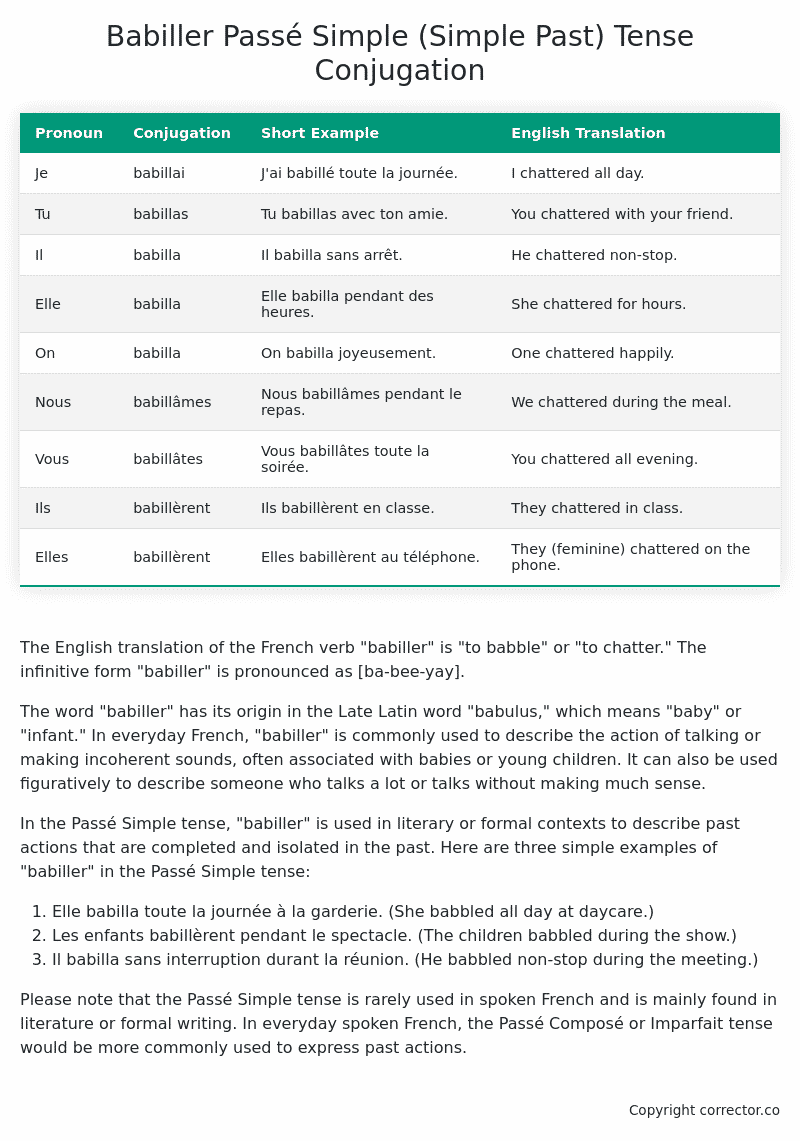Passé Simple (Simple Past) Tense Conjugation of the French Verb babiller
Introduction to the verb babiller
The English translation of the French verb “babiller” is “to babble” or “to chatter.” The infinitive form “babiller” is pronounced as [ba-bee-yay].
The word “babiller” has its origin in the Late Latin word “babulus,” which means “baby” or “infant.” In everyday French, “babiller” is commonly used to describe the action of talking or making incoherent sounds, often associated with babies or young children. It can also be used figuratively to describe someone who talks a lot or talks without making much sense.
In the Passé Simple tense, “babiller” is used in literary or formal contexts to describe past actions that are completed and isolated in the past. Here are three simple examples of “babiller” in the Passé Simple tense:
- Elle babilla toute la journée à la garderie.
(She babbled all day at daycare.) - Les enfants babillèrent pendant le spectacle.
(The children babbled during the show.) - Il babilla sans interruption durant la réunion.
(He babbled non-stop during the meeting.)
Please note that the Passé Simple tense is rarely used in spoken French and is mainly found in literature or formal writing. In everyday spoken French, the Passé Composé or Imparfait tense would be more commonly used to express past actions.
Table of the Passé Simple (Simple Past) Tense Conjugation of babiller
| Pronoun | Conjugation | Short Example | English Translation |
|---|---|---|---|
| Je | babillai | J’ai babillé toute la journée. | I chattered all day. |
| Tu | babillas | Tu babillas avec ton amie. | You chattered with your friend. |
| Il | babilla | Il babilla sans arrêt. | He chattered non-stop. |
| Elle | babilla | Elle babilla pendant des heures. | She chattered for hours. |
| On | babilla | On babilla joyeusement. | One chattered happily. |
| Nous | babillâmes | Nous babillâmes pendant le repas. | We chattered during the meal. |
| Vous | babillâtes | Vous babillâtes toute la soirée. | You chattered all evening. |
| Ils | babillèrent | Ils babillèrent en classe. | They chattered in class. |
| Elles | babillèrent | Elles babillèrent au téléphone. | They (feminine) chattered on the phone. |
Other Conjugations for Babiller.
Le Present (Present Tense) Conjugation of the French Verb babiller
Imparfait (Imperfect) Tense Conjugation of the French Verb babiller
Passé Simple (Simple Past) Tense Conjugation of the French Verb babiller (You’re reading it right now!)
Passé Composé (Present Perfect) Tense Conjugation of the French Verb babiller
Futur Simple (Simple Future) Tense Conjugation of the French Verb babiller
Futur Proche (Near Future) Tense Conjugation of the French Verb babiller
Plus-que-parfait (Pluperfect) Tense Conjugation of the French Verb babiller
Passé Antérieur (Past Anterior) Tense Conjugation of the French Verb babiller
Futur Antérieur (Future Anterior) Tense Conjugation of the French Verb babiller
Subjonctif Présent (Subjunctive Present) Tense Conjugation of the French Verb babiller
Subjonctif Passé (Subjunctive Past) Tense Conjugation of the French Verb babiller
Subjonctif Imparfait (Subjunctive Imperfect) Tense Conjugation of the French Verb babiller
Subjonctif Plus-que-parfait (Subjunctive Pluperfect) Tense Conjugation of the French Verb babiller
Conditionnel Présent (Conditional Present) Tense Conjugation of the French Verb babiller
Conditionnel Passé (Conditional Past) Tense Conjugation of the French Verb babiller
Conditionnel Passé II (Conditional Past II) Tense Conjugation of the French Verb babiller
L’impératif Présent (Imperative Present) Tense Conjugation of the French Verb babiller
L’impératif Passé (Imperative Past) Tense Conjugation of the French Verb babiller
L’infinitif Présent (Infinitive Present) Tense Conjugation of the French Verb babiller
L’infinitif Passé (Infinitive Past) Tense Conjugation of the French Verb babiller
Le Participe Présent (Present Participle) Tense Conjugation of the French Verb babiller
Le Participe Passé (Past Participle) Tense Conjugation of the French Verb babiller
Struggling with French verbs or the language in general? Why not use our free French Grammar Checker – no registration required!
Get a FREE Download Study Sheet of this Conjugation 🔥
Simply right click the image below, click “save image” and get your free reference for the babiller Passé Simple tense conjugation!

Babiller – About the French Passé Simple (Simple Past) Tense
Formation
Usage
Narration
Historical Context
Interactions with other tenses
Passé Composé
Imparfait
Conditional and Subjunctive
Summary
I hope you enjoyed this article on the verb babiller. Still in a learning mood? Check out another TOTALLY random French verb conjugation!


